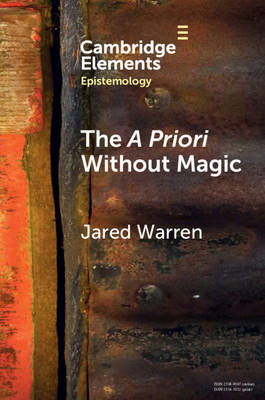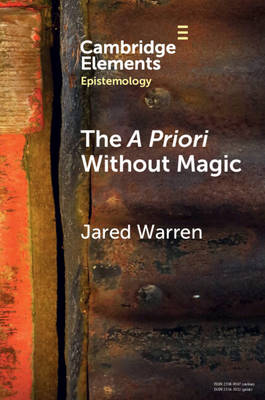
Je cadeautjes zeker op tijd in huis hebben voor de feestdagen? Kom langs in onze winkels en vind het perfecte geschenk!
- Afhalen na 1 uur in een winkel met voorraad
- Gratis thuislevering in België vanaf € 30
- Ruim aanbod met 7 miljoen producten
Je cadeautjes zeker op tijd in huis hebben voor de feestdagen? Kom langs in onze winkels en vind het perfecte geschenk!
- Afhalen na 1 uur in een winkel met voorraad
- Gratis thuislevering in België vanaf € 30
- Ruim aanbod met 7 miljoen producten
Zoeken
€ 33,45
+ 66 punten
Omschrijving
The distinction between the a priori and the a posteriori is an old and influential one. But both the distinction itself and the crucial notion of a priori knowledge face powerful philosophical challenges. Many philosophers worry that accepting the a priori is tantamount to accepting epistemic magic. In contrast, this Element argues that the a priori can be formulated clearly, made respectable, and used to do important epistemological work. The author's conception of the a priori and its role falls short of what some historical proponents of the notion may have hoped for, but it allows us to accept and use the notion without abandoning either naturalism or empiricism, broadly understood. This Element argues that we can accept and use the a priori without magic.
Specificaties
Betrokkenen
- Auteur(s):
- Uitgeverij:
Inhoud
- Aantal bladzijden:
- 78
- Taal:
- Engels
- Reeks:
Eigenschappen
- Productcode (EAN):
- 9781009015769
- Verschijningsdatum:
- 13/10/2022
- Uitvoering:
- Paperback
- Formaat:
- Trade paperback (VS)
- Afmetingen:
- 152 mm x 229 mm
- Gewicht:
- 117 g

Alleen bij Standaard Boekhandel
+ 66 punten op je klantenkaart van Standaard Boekhandel
Beoordelingen
We publiceren alleen reviews die voldoen aan de voorwaarden voor reviews. Bekijk onze voorwaarden voor reviews.









